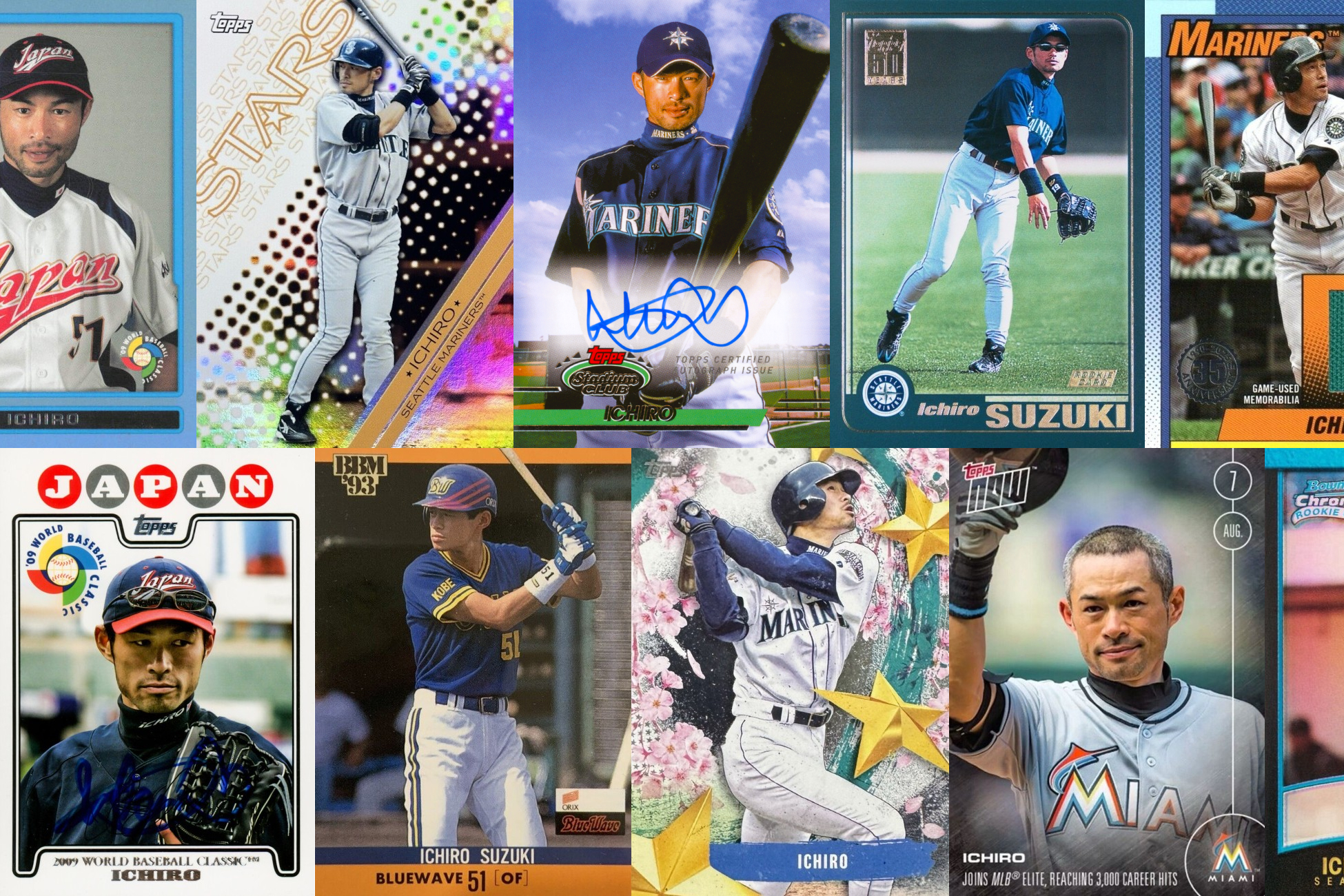When Ichiro Suzuki is officially enshrined in the Baseball Hall of Fame in 2025, it will be one of the most anticipated inductions in recent memory. A global icon who bridged the gap between Japanese and Major League Baseball, Ichiro redefined what it meant to be a pure hitter. His impact on the sport is undeniable, and his baseball cards serve as a testament to his legendary career. From his earliest cards in Japan to his highly sought-after 2001 rookie issues with the Seattle Mariners, Ichiro Suzuki cards have been fan favorites for decades, capturing the essence of a player whose style and skill captivated audiences worldwide.
Collectors and baseball fans alike have long revered Ichiro’s cards, not just for their value but for the story they tell. His journey from Japan’s Nippon Professional Baseball (NPB) to MLB stardom is reflected in his cardboard legacy, with key cards marking milestones such as his record-breaking hit totals, MVP season, and farewell moments. As the baseball world prepares to honor his Hall of Fame induction, it’s the perfect time to explore the significance of Ichiro Suzuki’s baseball cards and what they represent in the history of the sport.
Ichiro Suzuki’s Career
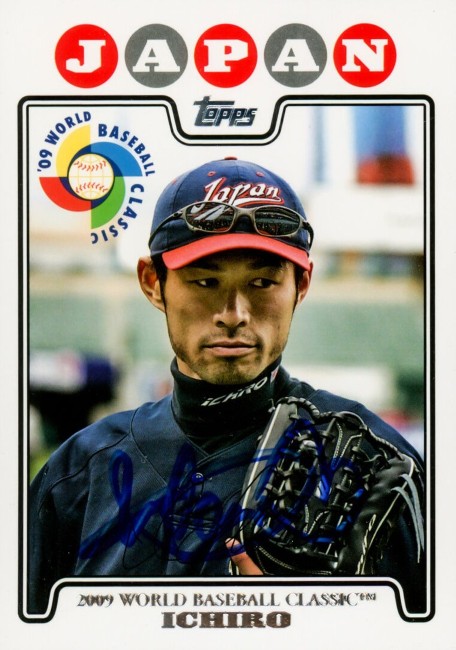
Ichiro Suzuki’s journey to baseball immortality began in Japan, where he dominated Nippon Professional Baseball as a member of the Orix BlueWave. His unorthodox but highly effective batting stance and unmatched hand-eye coordination made him one of the best hitters Japan had ever seen. Over nine NPB seasons, Ichiro amassed 1,278 hits, won seven consecutive batting titles, and led Orix to a Japan Series appearance. His performance caught the attention of MLB scouts, and in 2001, the Seattle Mariners signed him as the first Japanese-born position player to transition directly to the major leagues.
Ichiro’s impact in MLB was immediate and historic. He won both the American League Rookie of the Year and MVP awards in his debut season while leading the Mariners to a record-tying 116 wins. His distinctive slap-hitting approach, speed, and defensive prowess in right field made him one of the most electrifying players in the game. Over 19 MLB seasons, Ichiro racked up 3,089 hits, led the league in hits seven times, and set the single-season hit record with 262 in 2004. Combining his NPB and MLB totals, Ichiro’s 4,367 professional hits stand as the most by any player in baseball history.
Ichiro’s Hall of Fame Case and Legacy
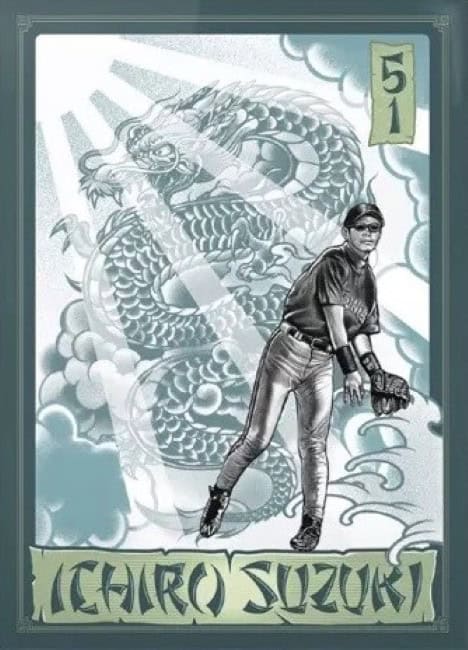
There is little debate about Ichiro Suzuki’s Hall of Fame credentials – his first-ballot induction was a foregone conclusion. With over 3,000 MLB hits, an MVP award, 10 Gold Gloves, and 10 All-Star appearances, his resume stands among the all-time greats on two continents. Beyond statistics, Ichiro’s influence on baseball’s globalization is immeasurable. He paved the way for countless Japanese players to follow, proving that international stars could not only succeed in MLB but thrive at the highest level.
Ichiro’s legacy extends beyond mere numbers. He changed the way hitters approached the game, showing that precision and bat control could be as valuable as power. His work ethic, discipline, and dedication to his craft made him an icon in both Japan and the United States. When he takes the stage in Cooperstown in 2025, he will not just be honored as a Hall of Famer but as one of the most important figures in baseball history.
Best Ichiro Suzuki Cards
1993 BBM Ichiro Suzuki #239
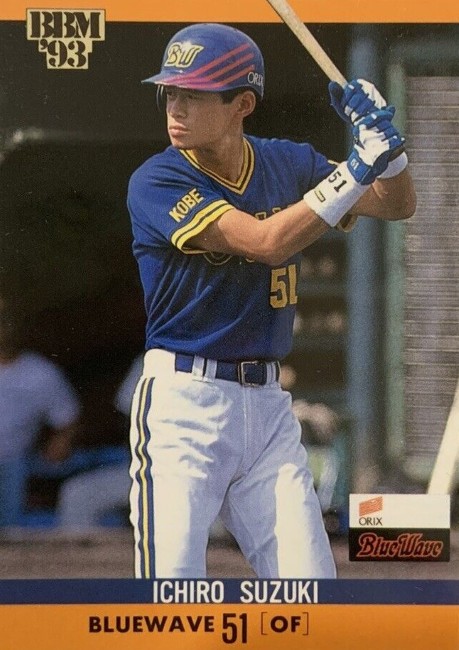
After playing a handful of games in 1992, Ichiro Suzuki had his first big opportunity in 1993 with the Orix BlueWave. Unfortunately, he struggled to find consistent playing time. As a result, Ichiro spent most of the season bouncing between the first team and the minors, appearing in only 40 games and recording just 19 hits in 64 at-bats for a .253 batting average. Despite his limited opportunities, he showed glimpses of his future greatness, displaying remarkable bat control and speed. However, it wasn’t until the following season that Ichiro was given a full-time role and began his meteoric rise to stardom in Nippon Professional Baseball (NPB).
American fans looking for a special Ichiro rookie card have several options, but the 1993 BBM Ichiro #239 strikes the right balance between style, price and availability. Most of Ichiro’s NPB rookies cost hundreds of dollars, but this one can be found by a shrewd collector for under $100. (Be on the lookout for reprints, which sells surprisingly high but aren’t genuine 1993 BBM cards.)
2001 Topps Ichiro Suzuki #726 (RC)
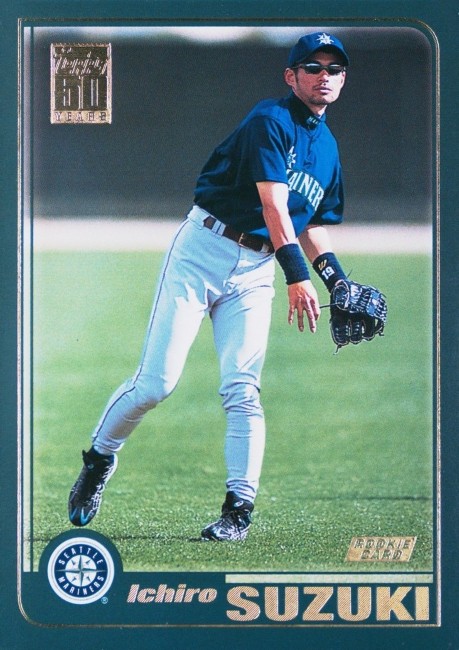
Ichiro Suzuki’s 2001 MLB season was nothing short of historic, as he took the league by storm in his rookie year with the Seattle Mariners. Arriving from Japan with immense expectations, he exceeded them all, leading the league in hits (242) and batting average (.350) while showcasing elite speed and defense in right field. His unique slap-hitting approach and baserunning instincts made him a nightmare for opposing pitchers and catchers, as he stole 56 bases and routinely turned singles into doubles with his hustle. Ichiro’s impact helped propel the Mariners to a record-tying 116-win season, and he became the first player since Fred Lynn in 1975 to win both the Rookie of the Year and MVP awards in the same season.
There were dozens of Ichiro Suzuki cards in 2001 sets, from Fleer and Upper Deck to the flagship Topps card highlighted here. While collectors can take their pick of ungraded Ichiro Suzuki cards around a $10-$20 price point, the 2001 Topps Ichiro #726 rookie card is the most well-known. This card was also part of Project 2020.
2001 SPx Auto Jersey Ichiro Suzuki #150
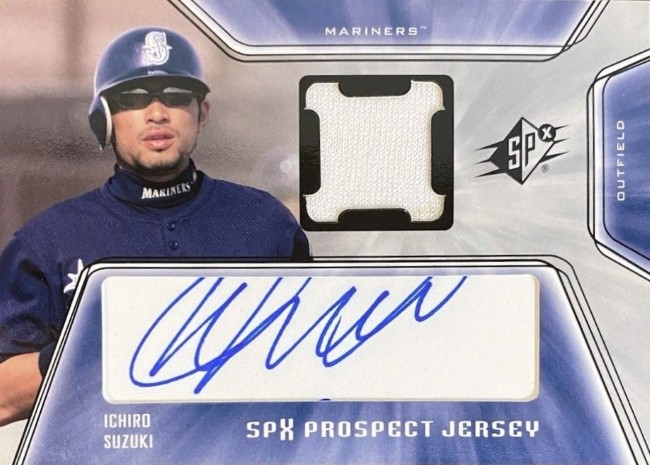
Autographed relic cards hold significant value due to their rarity and the personal connection they offer between the player and the collector. These cards feature both a player’s signature and a piece of game-used memorabilia. As such, they often fetch premium prices, especially when associated with legendary players or rare, limited editions.
Technically not a rookie card (we cover that terminology over here), this is a rookie year card and it’s a doozy. Anything with Ichiro’s name and likeness was a hot commodity in 2001, and this card featured not only a jersey swatch but his distinctive autograph. The only oddity is that it’s a cut signature, but most collectors don’t seem to care. The card is hard to find and sells for around $2,500-$5,000 raw.
Ichiro’s Historic 2004 Season
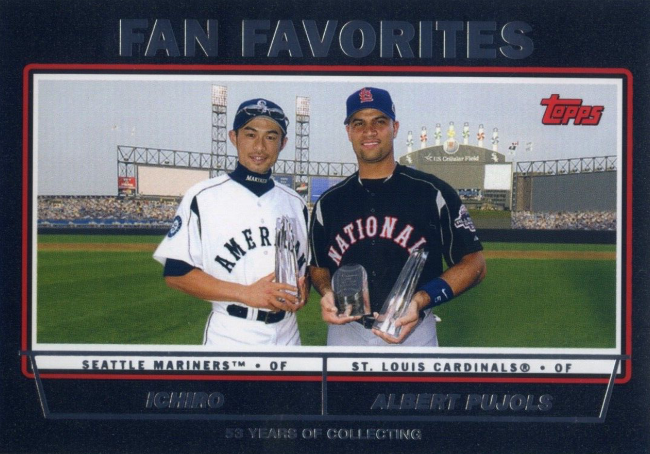
Ichiro Suzuki’s 2004 season was one of the greatest single-season performances in MLB history, as he shattered George Sisler’s long-standing record for hits in a season with an astonishing 262. Batting .372, Ichiro was nearly unstoppable at the plate, recording 50 multi-hit games and a staggering 924 plate appearances. He also stole 36 bases while playing elite defense in right field. Though the Mariners struggled as a team, Ichiro’s historic season cemented his legacy as one of the greatest contact hitters of all time.
Ichiro was a mega-star. Being in his orbit caused anyone’s stock to go up. You have your pick of hundreds of cards, but here are some favorites:
- 2004 Topps Heritage Doubleheader Ichiro / Albert Pujols Box Topper #3-4: These rare cards are patterned after the 1955 Topps Doubleheaders. You get two future Hall of Famers on one card. Pujols and Ichiro also appear together on the 2004 Topps Black #694 /53.
- 2004 Upper Deck SP Authentic Ichiro / Ken Griffey Jr. Autograph: This is such a cool card with two Seattle greats – the only thing that would make it better is if Griffey was in a Mariners uniform.
- 2004 Topps Gold Ichiro #10 /2004: These cards may have a high serial number, but they look amazing and can fetch several hundred dollars if they’re a high grade.
2007 Ichiro Suzuki Cards
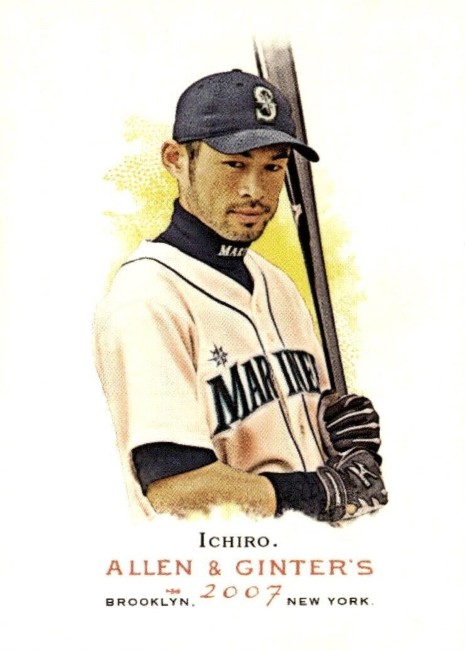
Ichiro Suzuki’s 2007 season was another brilliant display of his hitting prowess, speed, and defensive excellence. He won his second American League batting title with a .351 average and collected 238 hits, marking his seventh straight 200-hit season. At the All-Star Game, he became the first player to hit an inside-the-park home run in the event’s history, earning MVP honors. Ichiro also stole 37 bases and continued his streak of Gold Glove-winning defense in right field, further solidifying his status as one of the most dynamic players in baseball.
The 2007 Topps Allen & Ginter Ichiro Suzuki #300 perfectly captures his essence as both a player and a personality. The card’s minimalist design, featuring a detailed illustration of Ichiro against a clean white background, reflects his precision, poise, and timeless appeal. It’s also very affordable, at only $1 or $2 for an ungraded copy. Not all Ichiro Suzuki cards have to break the bank.
Ichiro’s Yankees Cards
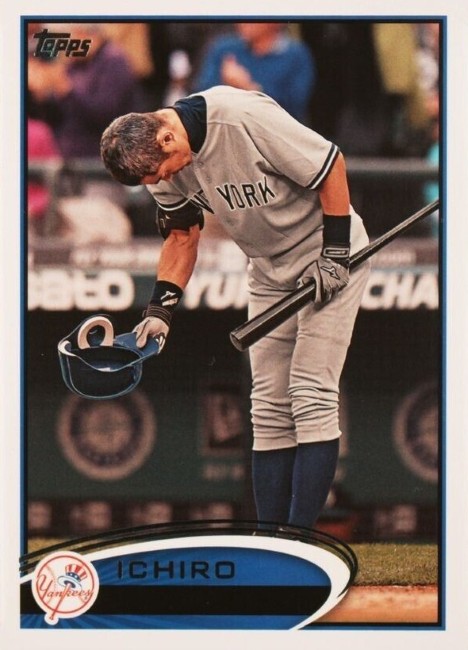
Ichiro Suzuki joined the New York Yankees in a midseason trade from the Seattle Mariners in 2012, bringing his trademark contact hitting, speed, and defense to the Bronx. He provided a spark for the Yankees, batting .322 in 67 games and helping them reach the postseason. Over two and a half seasons in New York, Ichiro remained a valuable contributor, recording his 4,000th professional hit (combining NPB and MLB totals) in 2013. Though his time with the Yankees wasn’t as dominant as his Seattle years, he remained a fan favorite and a respected veteran presence.
The 2012 Topps Update Image Variation (Bowing) Ichiro Suzuki #US272 is one of the first cards of Ichiro in a Yankees uniform, thanking the Seattle fans at Safeco field. This card is a fan favorite because it shows what an honorable player he was.
Ichiro’s Final Seasons
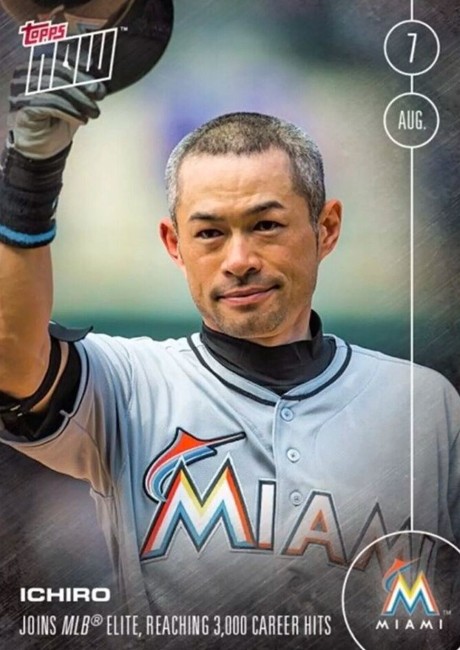
Ichiro Suzuki joined the Miami Marlins in 2015 as a veteran presence and fourth outfielder, but he continued adding to his legacy. In 2016, he recorded his 3,000th MLB hit, becoming just the 30th player in history to reach the milestone. Even in his 40s, he displayed remarkable durability and professionalism, occasionally flashing his signature speed and precision at the plate. Over three seasons with Miami, he embraced a mentor role while still contributing on the field, finishing his Marlins tenure with over 400 hits.
Ichiro’s crowning achievement in Miami is, undoubtedly, hitting his 3,000th hit. The 2016 Topps Now Ichiro Suzuki #327-A commemorates that moment, as a greying Ichiro doffs his helmet at the home fans in Colorado. He was only the second player ever to accomplish the feat by hitting a triple (the other was Paul Molitor).
Ichiro returned to Seattle in 2018 on a one-year contract, the second-oldest player in the majors. This second stint was a sentimental return to where his MLB career first took off. He provided veteran leadership and contributed as a part-time outfielder before moving into a front office and advisory role. In 2019, his final season, he played in the Mariners’ opening series in Japan, marking a fitting conclusion to his illustrious career. He retired as a Mariner, leaving behind a lasting legacy as one of the greatest contact hitters and most respected figures in baseball history.
Ichiro’ Legacy in Baseball Cards
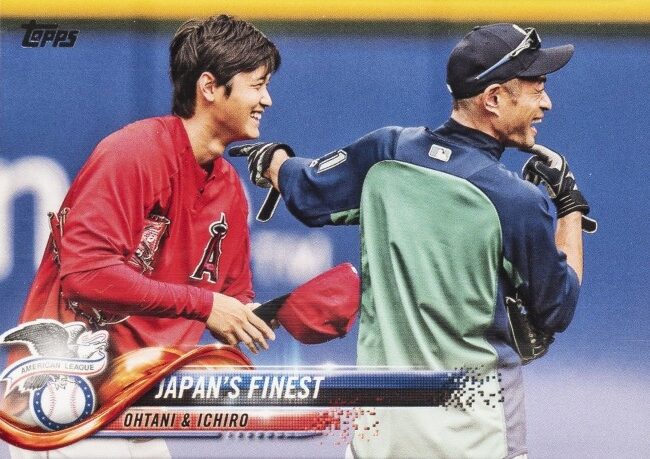
Ichiro Suzuki paved the way for future generations of Japanese MLB players, becoming a trailblazer and an iconic figure both in Japan and in the U.S. His success in MLB proved that Japanese players could thrive in the major leagues, setting a high standard of excellence with his work ethic, discipline, and consistency. Ichiro’s ability to adapt to the American game while maintaining his unique style influenced countless aspiring players from Japan, inspiring a wave of talent like Hideki Matsui, Yu Darvish, and Shohei Ohtani to follow in his footsteps and pursue careers in Major League Baseball. His impact on bridging the gap between Japanese and American baseball cultures cannot be overstated.
There are several cards that honor the relationship between Ichiro, the retiring hero, and Shohei Ohtani, the rookie phenom:
- 2018 Topps Update Ichiro Suzuki / Shohei Ohtani #US153
- 2019 Topps On Demand Ichiro Suzuki / Shohei Ohtani #15
- 2019 Topps Chrome Variation Ichiro Suzuki / Shohei Ohtani #1
- 2019 Topps Greatness Returns Ichiro Suzuki / Shohei Ohtani #GR-15
- 2019 Topps Japanese Rookies of the Year Ichiro Suzuki / Shohei Ohtani #HTL23
- 2019 Topps Gold Label Framed Dual Auto Ichiro Suzuki / Shohei Ohtani #FDA-10
- 2019 Donruss Diamond Kings Heirs to the Throne Ichiro Suzuki / Shohei Ohtani #HTT4
Shohei Ohtani, who is known for his dual-threat ability as both a pitcher and a hitter, has often mentioned Ichiro as an inspiration, particularly in terms of his professionalism, work ethic, and commitment to the game. Ichiro’s success in breaking barriers for Japanese players in MLB helped pave the way for Ohtani’s groundbreaking career.
Conclusion
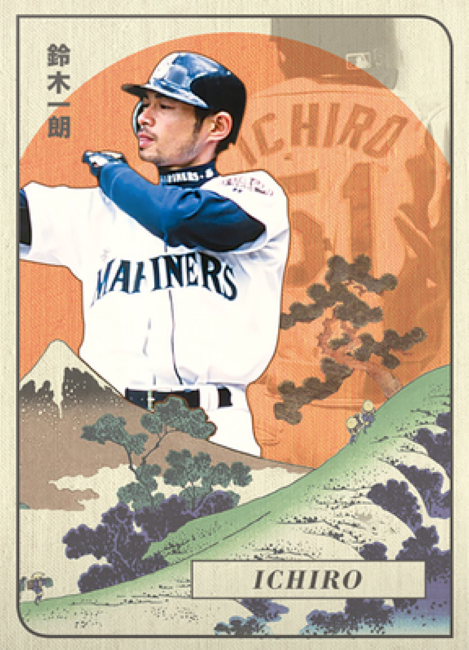
Ichiro Suzuki’s legacy in baseball is one that transcends statistics and accolades. It is defined by his unparalleled work ethic, his groundbreaking accomplishments, and his role as a cultural ambassador for the game. His career was marked by an extraordinary blend of contact hitting, speed, and defensive brilliance. With 3,089 hits in MLB and over 4,300 when combining his NPB and MLB totals, Ichiro redefined what it meant to be a consistent, elite performer over a long career. He shattered records, including the single-season hits record in 2004, and became the first player in history to record 200 hits in each of his first 10 seasons. But it wasn’t just his on-field performance that made him a legend—it was his meticulous attention to detail, his unshakable professionalism, and his ability to remain a humble yet dominant force in a highly competitive league.
Ichiro’s induction into the Baseball Hall of Fame in 2025 is the culmination of a career that changed the face of baseball, both in Japan and the United States. His achievements on the field are undeniable, but his influence goes far beyond the numbers. As a cultural pioneer, Ichiro demonstrated that baseball is a global game, and his journey helped open doors for other international players, especially those from Japan. His legacy is his remarkable talent and achievements, but also that he elevated the game to new heights and inspired future generations of players to strive for greatness, regardless of their background. His Hall of Fame induction is a well-deserved recognition of a career that has had a profound and lasting impact on the world of baseball.
